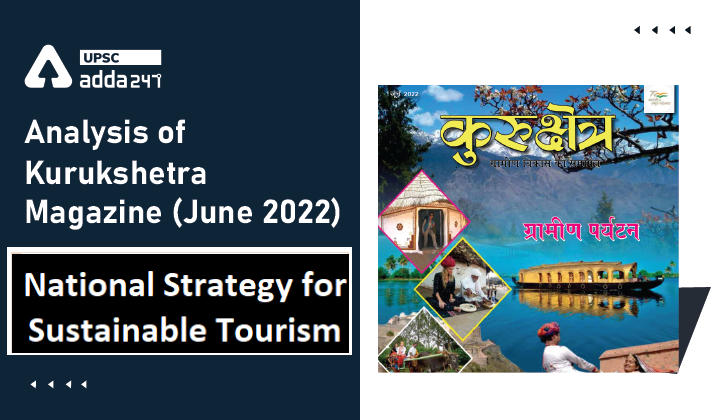Table of Contents
Kurukshetra is a Monthly Magazine which is issued by the Publications Division of the GOI.
Kurukshetra Magazine is one of the most important and indispensable source for UPSC Civil Services Exam Preparation. Keeping this in mind, here, we come with ”Analysis Of Kurukshetra Magazine” on daily basis, which covers the monthly Kurukshetra Magazine in easy and smooth pointed form, keeping in mind the demand of UPSC aspirants.
In ‘‘Analysis Of Kurukshetra Magazine,” we cover each and every topic of the Kurukshetra edition of a particular month and provide an easy-to-understand gist.
Introduction
- Tourism Ministry has recently launched the National Strategy for Sustainable Tourism and Responsible Traveller Campaign.
- The Ministry, in partnership with the United Nations Environment Program(UNEP) and Responsible Tourism Society of India (RTSOI) organized National Summit on Developing Sustainable and Responsible Tourist Destinations today in New Delhi.
Which are the Strategic Pillars for the development of sustainable tourism?
- The strategy document has identified the strategic pillars for the development of sustainable tourism like promoting environmental sustainability, protecting biodiversity, promoting economic sustainability, promoting socio-cultural sustainability, scheme for certification of sustainable tourism, IEC, and capacity building and governance.
The Goals of the National Strategy for Sustainable Tourism
- To accelerate tourism’s role in economic development – through a vibrant sustainable heritage tourism programme that creates decent jobs at community level, raise revenues, and helps make India a great place to live, visit, work and invest, while valuing and protecting its natural and cultural heritage.
- To broaden tourism’s role in social inclusiveness – through enriching lives and building on special characteristics of the local people, culture, history, geography, environment, economic activities and institutions.
- To boost tourism’s role in cultural values, environment, diversity and heritage management – through promoting a vibrant sustainable heritage tourism programme that will educate, delight, and entertain visitors, compel them to tell others, and motivate repeat visitors.
Relation between Tourism and Environment
- Tourism and the environment share a special relationship. Their interaction with each other is a two-way process.
- On the one hand, environmental resources constitute one of the basic ingredients of tourism. The natural and manmade setting form the tourism products which the tourist enjoys lives, and relaxes.
- On the other hand, the close and direct relationship between visitors, host communities, and the local environment creates a sensitive situation, whereby tourism can be both very damaging and also very positive for sustainable development.
About Swadesh Darshan 2.0
- Ministry of Tourism had launched Swadesh Darshan Scheme with the objective to provide experience to the tourists and has now sanctioned 76 Projects.
- They have now revamped the Swadesh Darshan Scheme as Swadesh Darshan 2.0.
- The idea of Swadesh Darshan 2.0 is to undertake holistic development with the vision to develop Sustainable and Responsible Tourist Destinations.
- The Scheme will encourage the adoption of principles of sustainable tourism including environmental, socio-cultural and economic sustainability.
Way Forward
- The COVID-19 pandemic has further forced the tourism sector to shift its focus to resiliency, sustainability, and interconnectedness among diverse stakeholders in the sector.
- So, state tourism policies should recognize sustainability principles and the Sustainable Development Goals in their vision and strategic direction for tourism.
- With the vision to create a sustainable future for tourism, the Scheme & strategy will encourage the adoption of principles of sustainable tourism including environmental, socio-cultural, and economic sustainability



 TSPSC Group 1 Question Paper 2024, Downl...
TSPSC Group 1 Question Paper 2024, Downl...
 TSPSC Group 1 Answer key 2024 Out, Downl...
TSPSC Group 1 Answer key 2024 Out, Downl...
 UPSC Prelims 2024 Question Paper, Downlo...
UPSC Prelims 2024 Question Paper, Downlo...




